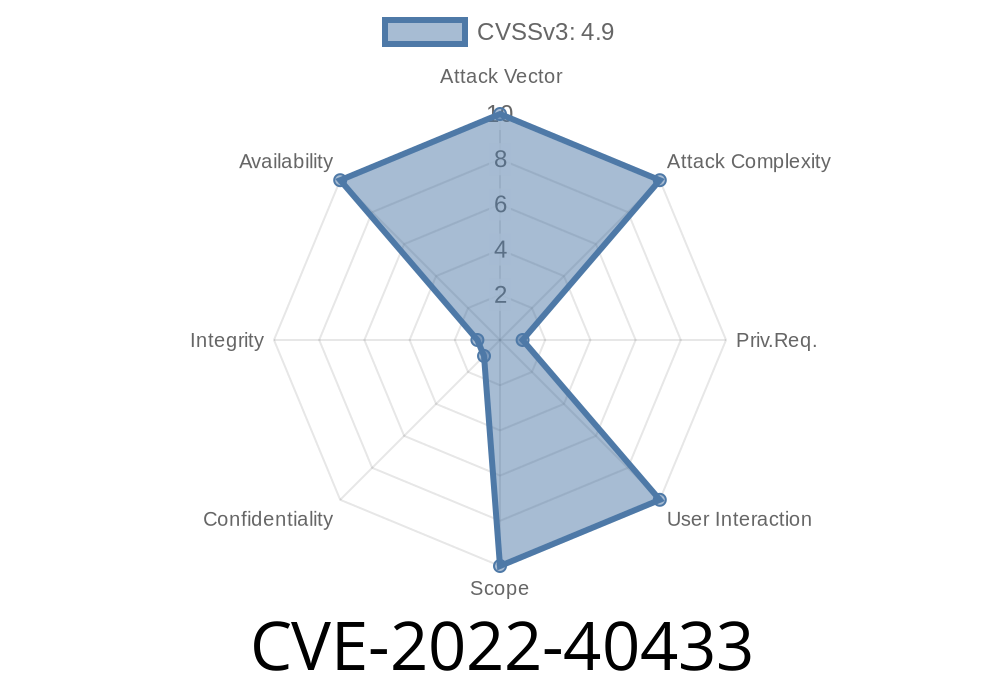Java is everywhere, running millions of apps and systems. The Java Virtual Machine (JVM) is what makes Java code run, and Oracle’s HotSpot is one of the most popular JVM implementations. But no software is perfect, and sometimes deep in the complex code of the JVM, security bugs pop up — that’s what happened with CVE-2022-40433.
This post will explain this vulnerability in plain English, show the code area affected, give a sample way it could be exploited, and link to official resources for those who want to dig deeper.
What Is CVE-2022-40433?
CVE-2022-40433 is a security issue discovered in OpenJDK (HotSpot VM) versions 8, 11, and 17, as well as Oracle’s JDK (HotSpot VM) 11 and 17. The problem lives inside the function ciMethodBlocks::make_block_at, found deep in the HotSpot code that handles compiled Java methods.
The bug allows an attacker — who can run code inside the JVM (e.g., by deploying a malicious class or bytecode) — to crash the JVM, causing a Denial of Service (DoS). It does not allow running arbitrary native code, but just being able to knock out the JVM can be very disruptive for server-side apps, cloud systems, and more.
Where’s the Problem?
The problem lies in the OpenJDK/HotSpot method ciMethodBlocks::make_block_at. This function is responsible for creating what's called a "basic block" for the Java method's compiled code, which is essential to performance and optimization.
In certain cases, it does not correctly handle specific incoming data — in particular, with malformed bytecode (Java’s low-level code). It trustingly processes the data assuming it’s always correct, so specially crafted bytecode can cause it to read or write outside its normal area (like a null pointer or an out-of-bounds read), and CRASH the JVM process.
Original Flawed Code (Example Snippet)
Below is a simplified (and slightly abstracted) version of what this function is doing. Do not use this code in your projects! This is just for understanding.
// C++-like pseudocode for illustration!
ciBlock* ciMethodBlocks::make_block_at(int bci) {
ciBlock* block = _blocks->at(bci);
if (block == NULL) {
block = new ciBlock();
_blocks->at_put(bci, block);
// ... process more
}
return block;
}
Here, bci is the bytecode index. If the supplied bci is unexpectedly large or negative (based on the method's bytecode boundaries), _blocks->at(bci) may access invalid memory, or allocate way too much memory, which can trigger JVM crashes.
How Could Someone Exploit It?
An attacker would need to be able to run Java code (even untrusted, in the same JVM process). By making a Java class with invalidly crafted bytecode (doable using tools like ASM, BCEL, or raw hex editors), they could force the JVM to process this bytecode, triggering the faulty path in make_block_at.
Here’s a high-level step-by-step
1. Create or manipulate a Java class so that it includes bytecode operations with illegal bytecode indexes (e.g., jumping to unreachable or nonsensical offsets).
The attacker loads this class in a JVM that has this vulnerable function.
3. When the JVM tries to optimize or introspect the class (like during JIT compilation), it hits the badly formed bytecode.
Sample Exploit (Conceptual, not production-ready!)
// Java code trustingly loading a crafted class file.
byte[] evilClassData = fetchMaliciousClassFromAttacker();
ClassLoader loader = new EvilClassLoader();
Class<?> evilClass = loader.defineClass(null, evilClassData, , evilClassData.length);
// Running this can crash the JVM if the class is crafted to exploit CVE-2022-40433
evilClass.newInstance();
And the attacker would use a Java bytecode editor to create, say, a jump or exception handler with an out-of-range bytecode offset.
Real-World Impact
- Denial of Service: The JVM can crash, taking down web servers, app containers, or anything that runs Java.
- Scenarios: Cloud environments where untrusted code is run (e.g., serverless, plugins, testing sandboxes), old CI/CD pipelines, or Trojan-horse Java libraries.
Fix & Protection
Oracle and OpenJDK have fixed this bug by adding stricter checks on bytecode indices. If you use Java 8, 11, or 17, ensure you’re updated past these 2022 security updates.
- Oracle CPU Notes
- OpenJDK Vulnerability Advisory
- Public CVE: NVD Entry
Conclusion
CVE-2022-40433 is a reminder that even the core of critical systems like Java's JVM can have dangerous bugs. If you’re running Java servers or apps, update to patched HotSpot versions now. If you run code from outside your org, double-check your class loading policies. Stay safe!
References
- Oracle October 2022 Patch Update
- NIST National Vulnerability Database - CVE-2022-40433
- OpenJDK JBS Bug ID 8295126
- Github Security Advisory for hotspot
If you have questions about JVM security or want to discuss incident response, contact your trusted security advisor or reach out to the OpenJDK community.
Timeline
Published on: 08/22/2023 19:16:00 UTC
Last modified on: 09/25/2023 17:23:00 UTC
